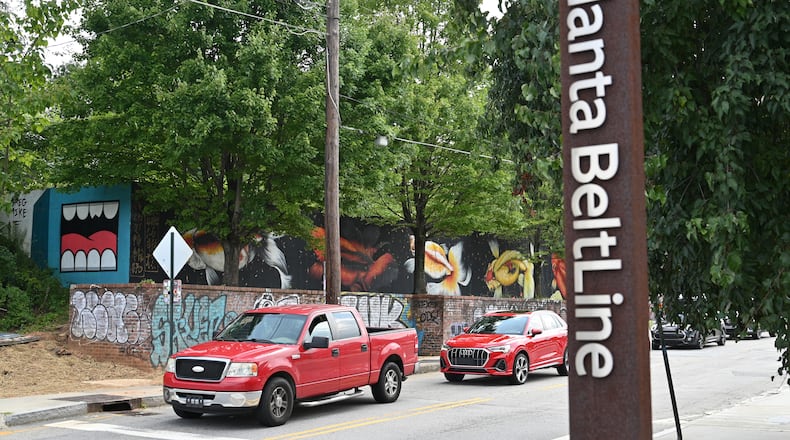The Atlanta City Council on Monday voted to adopt an ordinance prohibiting the construction of new drive-through and drive-in buildings within a half-mile of the Beltline in an effort to limit vehicle traffic near the trail.
The council also OK’d an ordinance banning new gas stations within a half-mile of the Beltline.
Councilman Jason Dozier, who authored the ordinances, said the legislation matters because the number of pedestrians struck and killed by motorists in Atlanta more than doubled between 2020 and 2021. He said Black pedestrians are twice as likely to be struck and killed while walking than any other ethnic group.
“Having been a victim of traffic violence, having been hit by a car, having had to go to Grady (Hospital), I know how important it is for the city to commit all tools in the toolbox to ensure that we can keep our streets safe for everyone,” Dozier said after the vote.
The Beltline consists of greenspace, trails, transit and new development along 22 miles of the historic railroad corridor encircling Atlanta. Dozier said the Beltline ordinances align with the city’s Vision Zero strategy to eliminate traffic fatalities and severe injuries.
Councilman Antonio Lewis was the sole no vote against the drive-through ban, and Councilman Michael Julian Bond was absent during that vote. Dozier’s colleagues unanimously OK’d the gas station ban.
Credit: Jason Getz / Jason.Getz@ajc.com
Credit: Jason Getz / Jason.Getz@ajc.com
But Dozier’s third ordinance, which would remove minimum parking requirements for buildings in a half-mile of the Beltline, was referred back to the Atlanta Zoning Review Board and the council’s Zoning Committee.
Dozier said he sponsored the ordinance to remove the city’s requirement for parking for commercial and residential buildings in an effort to incentivize more pedestrian-friendly designs near the Beltline trail.
The council, however, voted to substitute the ordinance with new, additional language specifying limits on minimum and maximum parking for developments within the area.
Councilman Dustin Hillis introduced a substitute ordinance that would maintain the Beltline-adjacent minimum parking requirement for “ghost kitchens,” which are virtual restaurants that solely serve customers via delivery and pick-up, as opposed to the traditional sit-down, brick-and-mortar dining experience.
The substitute also adds Councilman Alex Wan as a co-sponsor to the parking ordinance, which holds the fewest number of sponsors among Dozier’s three proposals.
“There were some concerns raised also from various communities about the impact this has on eating and drinking establishments, particularly as it impacts the process for alcohol license applications,” said Wan, adding that those Beltline-adjacent businesses would also keep the minimum parking requirement.
Lewis said parts of the Beltline touch his district and he’s seen historic communities in those areas repeatedly oppose developments with reduced or no parking. He said neighborhood planning units should be empowered to decide the amount of parking allotted to new developments in their area.
“I want to caution us as we look at the ‘no parking’ in the south and in Atlanta,” Lewis said.
Dozier told the public “this is not going to be the end of this legislation.”
Dozier’s comments came hours after public comment, during which Pittsburgh resident Tyrone Clemons spoke in support of the parking ordinance as well as regulations to manage parking spaces.
“Parking is not a free commodity,” Clemons said. “They take up real estate that could be used towards housing which we keep hearing is so desperately needed in the city.
“It’s an unhealthy environment implication of having large surface lots that aren’t necessarily needed but are arbitrarily regulated due to the past car incentives of different governments.”
About the Author
Keep Reading
The Latest
Featured


